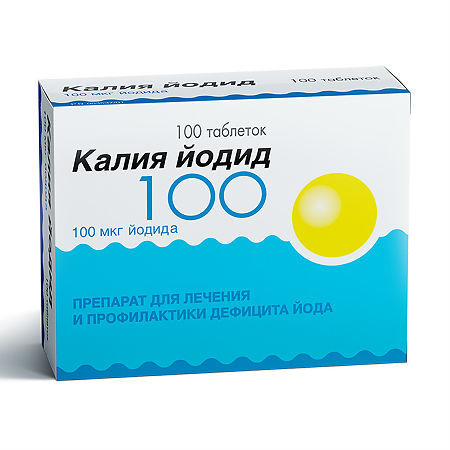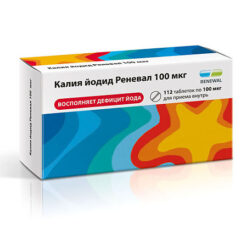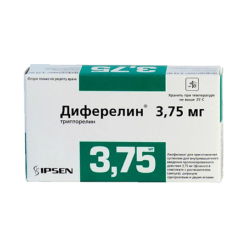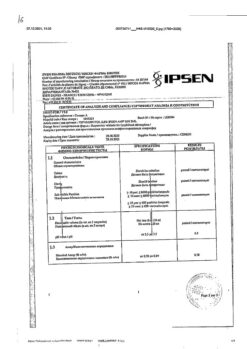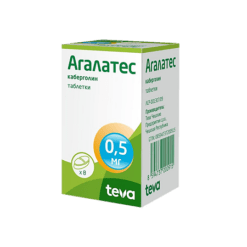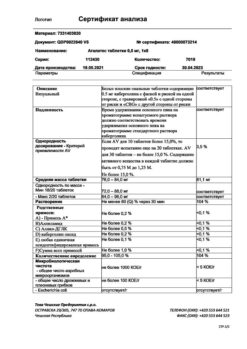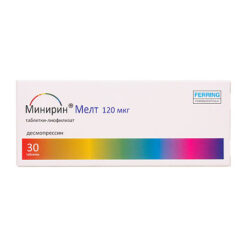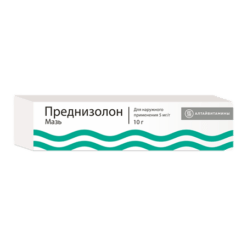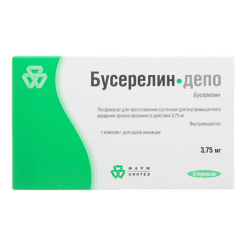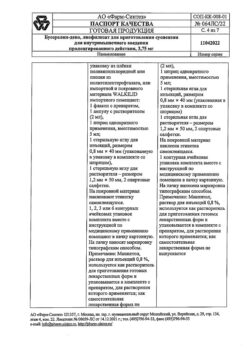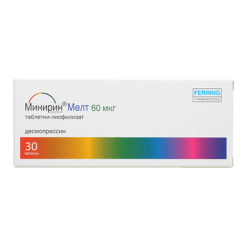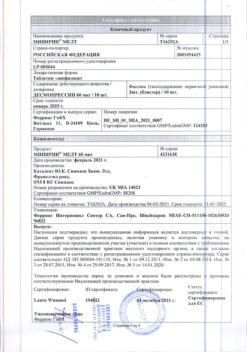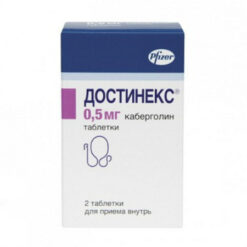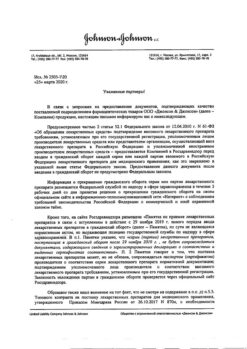No products in the cart.
Potassium iodide, tablets 100 mcg 100 pcs
€2.55 €2.13
Description
Potassium iodide is a remedy containing inorganic iodine.
Iodine refers to the essential trace elements necessary for normal functioning of the thyroid gland.
When iodide enters the epithelial cells of the thyroid follicle, iodine ions under the influence of the enzyme iodide peroxidase are oxidized to form elemental iodine, which is included in the molecule tyrosine.
In doing so, one part of the thyrosine radicals in thyroglobulin is iodinated, resulting in the formation of thyronines, the main ones being thyroxine (T4) and triiodothyronine (T3). The thyronines form a complex with the protein thyroglobulin, which is deposited in the colloid of the thyroid follicle.
Iodine entering the body in physiological amounts, prevents the development of endemic goiter associated with iodine deficiency in food, normalizes the size of the thyroid gland in infants, children and adolescents, affecting the ratio of T3/T4, thyroid hormone.
Indications
Indications
Prevention and treatment of endemic goiter. Prevention of goiter relapse during complex treatment with thyroid hormone preparations.
Pharmacological effect
Pharmacological effect
Potassium iodide is a product containing inorganic iodine.
Iodine is an essential trace element necessary for the normal functioning of the thyroid gland.
When iodides enter the epithelial cells of the thyroid follicle, iodine ions under the influence of the enzyme iodide peroxidase are oxidized to form elemental iodine, which is included in the tyrosine molecule.
In this case, one part of the tyrosine radicals in thyroglobulin is iodinated, resulting in the formation of thyronines, the main of which are thyroxine (T4) and triiodothyronine (T3). Thyronines form a complex with the protein thyroglobulin, which is deposited in the colloid of the thyroid follicle.
Iodine entering the body in physiological quantities prevents the development of endemic goiter associated with a lack of iodine in food; normalizes the size of the thyroid gland in newborns, children and adolescents; affects the T3/T4 ratio and the level of thyroid-stimulating hormone.
Special instructions
Special instructions
Before starting treatment, it is necessary to exclude malignant lesions of the thyroid gland, hyperthyroidism or nodular toxic goiter.
During drug therapy in patients with impaired renal function, hyperkalemia may develop (periodic monitoring of potassium levels in the blood is necessary).
Active ingredient
Active ingredient
Potassium iodide
Composition
Composition
1 tablet contains potassium iodide 0.131 mg, in terms of iodide, respectively – 0.100 mg.
Excipients:
lactose (milk sugar),
magnesium hydroxycarbonate (magnesium carbonate basic),
microcrystalline cellulose,
sodium croscarmellose,
magnesium stearate,
talc,
colloidal silicon dioxide (aerosil)
Pregnancy
Pregnancy
During pregnancy and breastfeeding, the need for iodine increases.
Potassium iodide is prescribed according to indications in three cases when iodine intake from food is less than 200 mcg/day.
The drug penetrates the placenta well and can cause the development of hypothyroidism and goiter in the fetus. Iodine is also excreted in breast milk.
Therefore, during pregnancy and breastfeeding, the drug should be taken only in recommended doses.
Contraindications
Contraindications
Severe hyperthyroidism, latent hyperthyroidism (when using doses exceeding 150 mcg/day), toxic adenoma, nodular or diffuse toxic goiter (when used in doses of 300-1000 mcg/day), dermatitis herpetiformis (Dühring’s disease), pregnancy and breastfeeding (when used in doses of 1-2 mg/day), hypersensitivity to drugs Yoda.
Side Effects
Side Effects
Manifestations of iodism: swelling of the nasal mucosa, urticaria, Quincke’s edema, eosinophilia, shock; tachycardia, irritability, sleep disturbances, increased sweating, diarrhea are also possible (in patients over 40 years of age); in some cases, when using doses exceeding 300-1000 mcg/day, hyperthyroidism may develop (especially in elderly patients, in the presence of nodular or diffuse toxic goiter); with high-dose therapy (more than 1 mg/day), iodine-induced goiter and, accordingly, hypothyroidism may develop.
Interaction
Interaction
Simultaneous use of antithyroid drugs weakens the effect of potassium iodide (mutually).
Potassium perchlorate and thiocyanate inhibit iodine uptake by the thyroid gland. Thyroid-stimulating hormone improves the absorption of iodine by the thyroid gland and stimulates the production of its hormones.
Concomitant use of angiotensin-converting enzyme inhibitors (including captopril, enalapril, lisinopril) increases the risk of hyperkalemia.
High doses of iodine in combination with potassium-sparing diuretics can lead to hyperkalemia.
Simultaneous administration of iodine therapy in high doses and lithium preparations promotes the development of goiter and hypothyroidism.
Reduces the uptake of 131I and 123I by the thyroid gland.
Overdose
Overdose
Symptoms of acute overdose: brown discoloration of mucous membranes, reflex vomiting, abdominal pain and diarrhea (possibly melena). In severe cases, dehydration and shock may develop.
Treatment for acute overdose: gastric lavage, administration of sodium thiosulfate, symptomatic treatment of water-electrolyte imbalance, anti-shock therapy.
Chronic overdose can lead to the development of the phenomenon of “iodism”: “metallic” taste in the mouth; swelling and inflammation of the mucous membranes (rhinitis, conjunctivitis, gastroenteritis, bronchitis); acne; dermatitis; swelling of the salivary glands; fever; nervous excitability.
Treatment for chronic overdose: drug withdrawal.
Storage conditions
Storage conditions
Store in a place protected from light at a temperature not exceeding 25 °C.
Shelf life
Shelf life
3 years.
Manufacturer
Manufacturer
Alium JSC, Russia
Additional information
| Shelf life | 3 years. |
|---|---|
| Conditions of storage | Store in a dark place at a temperature not exceeding 25 oC. |
| Manufacturer | Alium JSC, Russia |
| Medication form | pills |
| Brand | Alium JSC |
Other forms…
Related products
Buy Potassium iodide, tablets 100 mcg 100 pcs with delivery to USA, UK, Europe and over 120 other countries.

